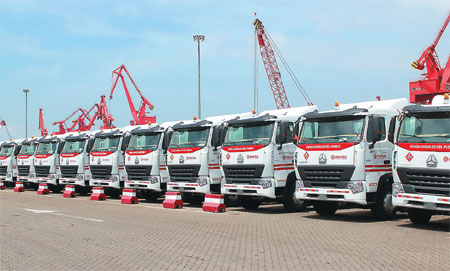Shandong Special: Truck maker on the road to Party building
|
Trucks made by China National Heavy-Duty Truck Group Co await shipment to Venezuela. Established in 1956 in Shandong province, the company is a pioneer in China's heavy truck industry. Photos Provided to China Daily |
China National Heavy-Duty Truck Group Co, a State-owned heavy truck manufacturer also known as Sinotruk, is making progress in Party building.
Party building is a large part of Chinese government and State-owned companies.
The reform of State-owned enterprises has always been the key link of China's economic restructuring.
Since the start of reform and opening-up, the Chinese central government has made various experiments and tried every means to solve the problem of long-term, extensive losses incurred by State-owned enterprises.
Successful Party building improves cohesion, creativity and core competitiveness of a State-owned enterprise.
It lays a solid foundation for soundly promoting the State-owned enterprise reform.
For companies like Sinotruk, Party building mainly covers areas including organization, publicity, discipline inspection, and dealing with workers' appeals.
Established in 1956 in Shandong province, Sinotruk was the pioneering enterprise in China's heavy truck industry.
The Huanghe JN150, the nation's first wholly self-manufactured heavy truck, rolled off the company's assembly line in 1960.
The company is now the largest heavy truck manufacturing base in China and has held the biggest share of the domestic market in its sector for years.
Its product portfolio includes heavy, middle and light-duty trucks, passenger cars, special purpose vehicles and construction machinery.
It exports to more than 96 countries and regions, and was credited as a national vehicle export base by the National Development and Reform Commission and the Ministry of Commerce.
The company faced several difficulties during the past few decades, especially in the 1990s, but they were solved under the guidance of the Party.
One of the key Party building functions was to ensure the Party's latest policies and regulations were implemented. Sinotruk was a big player in the Chinese market from the 1950s to 1970s but when the nation shifted development mode to a market economy in the 1990s, State-owned enterprises were challenged.
The company was on the edge of bankruptcy in the late 90s.
Sinotruk started to reform and restructure in 2001 and has since been brought back to life.
In 2007, the company built an international platform through a red-chip listing in Hong Kong.
In 2009, the firm developed a strategic partnership with Europe's leading heavy commercial vehicle maker MAN SE, bought a 25 percent share in Sinotruk Hong Kong Co Ltd, its Hong Kong-listed subsidiary, and signed an agreement to transfer some advanced technologies to the Chinese truck maker.
The reform, which was implemented under Communist Party guidance, solved the company's three main issues of finance, management and core technology.
Party building played an important role in Sinotruk's management and also in the decision-making process.
Under the system, main moves and major personnel transfers all need to be discussed and investigated by the Party.
The Party is responsible for supervising the company leaders to make sure they perform their duties and implement government policies and the Party also supervises finance, sales, purchases, project tendering and reform.
The latest policies and regulations for the reform of State-owned enterprises were issued during the Third Plenary Session of the 18th Communist Party of China Central Committee, which was held in Beijing from Nov 9 to 12, 2013.
Sinotruk will continue its reform process according to the regulations in four main areas.
Firstly, the company is expected to continue upgrading its shareholding systems, which should offer a variety of ownerships but State ownership should remain dominant.
Secondly, the company's management is expected to be market-oriented.
Thirdly, the shareholding structure will be upgraded to allow employees and executives to hold shares in the company. This move would not only integrate the interest of workers and capital owners, but also ensure that the interests of the employees were protected.
Fourthly, the company is expected to solve historical issues and pursue harmonious labor relations.
Sinotruk would focus on these four aspects to build itself into a modern international enterprise.
The author is the deputy Party secretary of China National Heavy-Duty Truck Group Co.

























